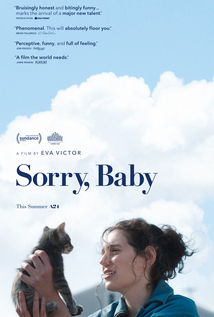

A quirky, A24 comedic drama about a young millennial recovering from trauma starring a first-time writer/director/lead actor? I braced myself for this one. Happily, Eva Victor's debut feature is a strong, well-conceived, and affecting work of indie cinema. Victor plays Agnes, a young literature professor who has landed a desirable teaching position at the same New England liberal arts college where she attended grad school. Still close with her former classmates, some of whom have moved on from the sleepy town and stagnant academic life, and some, like Agnes, have not. Still, Agnes seems the most awkward and stuck.
At first, it's hard to tell if there's something really off about her, or if she's just adopted certain affectations common to her generation that both distance her from others and make her seem charmingly idiosyncratic. In the film's early scenes, Agnes gets visited by her best friend from grad school, Lydie (Naomi Ackie), who now lives in New York City and shares the happy news that she's successfully gotten pregnant via a sperm donor. I'm eager to watch this film again, specifically to see how these early scenes with these two friends are written and directed now that I've seen the rest of the movie.
The narrative of Sorry, Baby unfolds in a non-linear way, which, for once in a quirky indie, is a deliberate thematic choice rather than a lazy way to make a weak script seem more interesting. Victor doesn't use flashbacks; they tell Agnes' story in four straightforward chapters arranged out of chronological order. This enables the viewer always to observe the protagonist in the present tense, even when we're learning about what's happened to her in the past. It's an ideal structure for a movie that is, first and foremost, a character study rather than an issue movie. One of the chapters in Sorry, Baby is called “The Year With the Bad Thing,” but this film isn't about a bad thing that happened to someone; it's about the lasting effects of that bad thing on that person. We become increasingly curious about Agnes and slowly come to understand her more and more as we get to know her in the years after an incident that has profoundly shaped her, but doesn't necessarily have to define her.
Victor's performance is most impressive because they are playing a deeply insecure character with the tangible confidence of a seasoned actor. This movie is clearly the work of a filmmaker who knows what they want to say and how they want to say it, who has both the talent and self-possession to pull it off. Yet all those attributes needed to write and direct a film like this would seem to run counter to what is required for the lead performance. Victor, however, threads that needle exquisitely. They also know how to write small yet significant roles for name actors that require a minimal commitment yet contribute mightily to the overall movie. It would not surprise me if Lucas Hedges shot his entire role in two days or if John Carroll Lynch had been on set for less than eight hours, yet both actors bring a great deal more to the picture than just their star power and a name on the poster.
Sorry, Baby is an intricate, deeply human film that doesn't offer easy answers because it's mature enough to understand all too well that there are no easy solutions to many of life's challenges. The film gives me hope that I may soon be able to retire my common complaint about movies I refer to as "millennial apology porn," in which the filmmakers and their characters seem to want to force a mea culpa from their parents or other older characters as if that will somehow fix everything by prooving that the younger folks are in the right and that all their unhappyness stems from the mistakes and insensitivities of the older generation. (I coined my phrase a few weeks before Emily St. James' much better-written, but far less critical, piece in Vox, in which they drew a similar conclusion from a similar series of films—noting that Everything Everywhere All at Once, Turning Red, Encanto, The Mitchells vs The Machines, and others were examples of a "millennial parental apology fantasy").
Happily, this simplistic trend seems to be fading in favor of more thorny and complicated explorations of trauma, parentally infected or otherwise, from young filmmakers. These writers and directors haven't lost the palpable confidence with which they put their stories forward; they simply tell their stories less simplistically, with far greater nuance and less unearned arrogance. In a year that's also given us Rungano Nyoni's On Becoming a Guinea Fowl, Celine Song's Materialists, and Annapurna Sriram's Fucktoys, I'm now finding myself delighting in movies about hyper-self-reliant young people navigating the complexities of modern life, wanting nothing from the older generation other than common decency and perhaps a little kindness. Sorry, Baby has a few heavy-handed scenes and a couple of on-the-nose dialogue exchanges that aren't worthy of the rest of the movie, but this is the best so far of a new crop of pictures, in which millennial filmmakers are showing the rest of us how they navigate, process, and live their complex lives rather than telling us how hard they have it.
Eva Victor's beautifully conceived and affecting debut about a young woman processing the lasting effects of trauma is the best example yet in a welcome trend of millennial filmmakers showing the rest of us how they navigate, process, and live their complex lives rather than just telling us how hard they have it.




